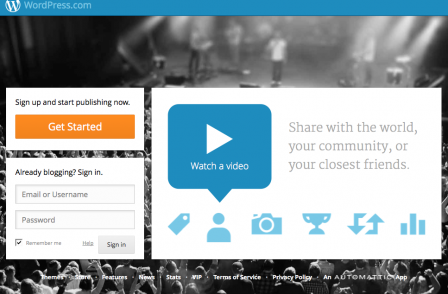
WordPress is ten years old in May and the parallels with Facebook, which was set up in 2004, are compelling. It’s like a tale of two brothers where one took to the world of dog-eat-dog capitalism with a devouring relish while the other became a missionary spreading the good word of open source.
Facebook has around a billion users while WP powers nearly 20 per cent of the world’s websites, a total of about 60m sites and constantly rising, with estimates of almost half of the world’s biggest blogs running on WP.
But while Facebook has floated on the stockmarket and is reckoned to be worth somewhere around the £10bn mark, the WP framework is still an open source project, which means it offers its software free to anyone who wants to install it on their website.
Facebook has at least 3,500 staff while WP has just 120 staff dotted around the world and no office. But WordPress isn’t a not-for-profit organisation and revenue for WP’s Automatic company for 2012 is estimated at around £30m, with the firm profitable and set to unleash another updated version of its software shortly.
Here’s a shortlist of a few of the media websites throughout the world that use WP: Bangor Daily News, Boingboing, BBC America, Buzzmachine, CNN, ElleGirl, Evening Edition, Express & Star, FiveThirtyEight, Flickr, Forbes, Independent Fashion Bloggers, Mashable, Metro, Milwaukee Police News, Le Monde, National Post, New York Times, Reuters, Shropshire Star, The Telegraph, StyleGirlfriend, StyleWatch, Washington Post, Wonkette.
You will notice I have included a mix of independent bloggers and massive multinational news companies and that’s the great thing about WP – anyone can set up a professional website at minimal cost, although the major companies generally sign up for WP’s VIP service.
The other important point for journalists and bloggers is that WP is becoming the go-to content management system for media organisations attracted by its multi-user capability after years of shelling out big money on clunky and inflexible proprietary CMSs. WP is becoming an essential skill for journalists and experience of running a WP website is a valuable addition to your CV.
You don’t need coding skills to run an impressive WP site. Most journalists should have at least a basic grounding in HTML nowadays and if you haven’t then you really should set about gaining some know-how but you don’t even need HTML for a WP site as the back end features a visual editor where you can style your posts.
CSS (Cascading Style Sheets) is also a relatively simple language and easy to learn but might be a step too far for many journalists who prefer to focus their efforts on producing content while PHP, the language behind the mechanics of WP, could be their worst nightmare.
WP isn’t just the domain of techies – any journalist can run a WP website with ease.
The default theme that comes with an installation is very basic, although the new incarnation promises a colourful change, but there are thousands of themes available, many of them free. You can switch between themes to change the look of your website while your content remains the same.
If you pay £40-£50 for one of the leading premium themes then you can get enormous power and flexibility in building and styling a professional website without having to be a coding expert.
Roger Packer is the author of WordPress for Journalists and Bloggers, a plain English guide to how to build a WP website without technical knowledge.
Email pged@pressgazette.co.uk to point out mistakes, provide story tips or send in a letter for publication on our "Letters Page" blog

